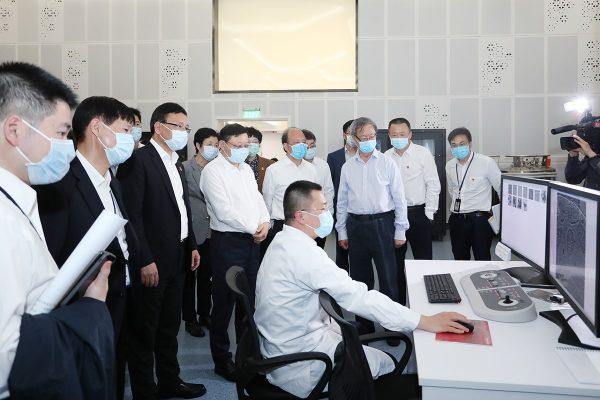On March 10, a delegation led by Shenzhen Municipal Party Committee Secretary Wang Weizhong and Mayor Chen Rugui visited Southern University of Science and Technology (SUSTech).
As part of this visit, they learned about the progress made in studying the novel coronavirus as well as other scientific applications utilized to defeat the epidemic.
Secretary Wang Weizhong and Mayor Chen Rugui expressed the highest respect and heartfelt gratitude, on behalf of the CPC Shenzhen Municipal Committee and Shenzhen Municipal People’s Government, to the scientific and medical communities working to protect the city during this challenging period.
During the inspection, Associate Professor Sun Dazhi (Department of Materials Science and Engineering – MSE), Associate Professor Song Xuan (Department of Computer Science and Engineering – CSE), and Cryo-Electron Microscopy Center Director Wang Peiyi (Department of Biology) provided briefings on their specific research outcomes.
SUSTech will continue to support research in a variety of disciplines related to emergencies to help the nation. Several teams across SUSTech had already applied to the National Natural Science Foundation of China (NSFC) National Coronavirus Research Program as well as various ministerial, provincial, and municipal programs.

COVID-19 scientific research outcomes at SUSTech (Updated by March 11)
The SUSTech Cryo-EM Center and the Second Affiliated Hospital of SUSTech (Shenzhen Third People’s Hospital) cooperated to isolate the virus strain and analyze its structure. It is the second laboratory in China to isolate the virus strain, and it is also the first time in the world to describe its viral architecture.
MSE Associate Professor Sun Dazhi led his research group to develop an anti-fog disinfectant wipe suitable for goggles. These simple wet wipes ensure that the goggle lens remains fog-free for at least twenty-four hours while being non-toxic to the human eyes and effective at killing bacteria. These wipes provide clean equipment throughout the entire day and make it easier for our health care workers in the battle against the novel coronavirus (COVID-19).
MSE Head Chair Professor Cheng Xing has devised an economical and efficient desktop sterilizer for personal protective masks. The desktop sterilizer, known as a mask regenerator, prolongs the life of surgical masks and similar pieces of disposable personal protection. The mask regenerator sterilizes used masks by using infrared technology, which alleviates the global mask shortage and reduces the hazard of medical pollution arising from discarded masks.
SUSTech Institute of Future Networks Technology Dean Liu Yunjie led a collaborative research team to develop a COVID-19 early warning system called NCP Transmission Route and Early Warning System (TWS). The Institute of Future Networks Technology works jointly with Peng Cheng Laboratory, Harbin Institute of Technology (Shenzhen), and the National University of Defense Technology through the application of cutting-edge technologies like the Internet of Things, AI, big data, and virus propagation models.
Chair Professor Xumu Zhang from the Department of Chemistry has worked to develop an efficient synthetic method for the synthesis of key intermediates of anti-HIV drugs, some of which could potentially be applied for treatment against the novel coronavirus.
Department of Biomedical Engineering head Chair Professor Jiang Xingyu led a team of professors to develop instruments supporting virus detection chips.
CSE Assistant Professor Tang Bo collaborated with the University of Macau, where they have developed a new system for mapping and mining patterns in different programs. The program will help decision-makers with their choices when it comes to dealing with the novel coronavirus (COVID-19).
Proofread ByXia Yingying
Photo By